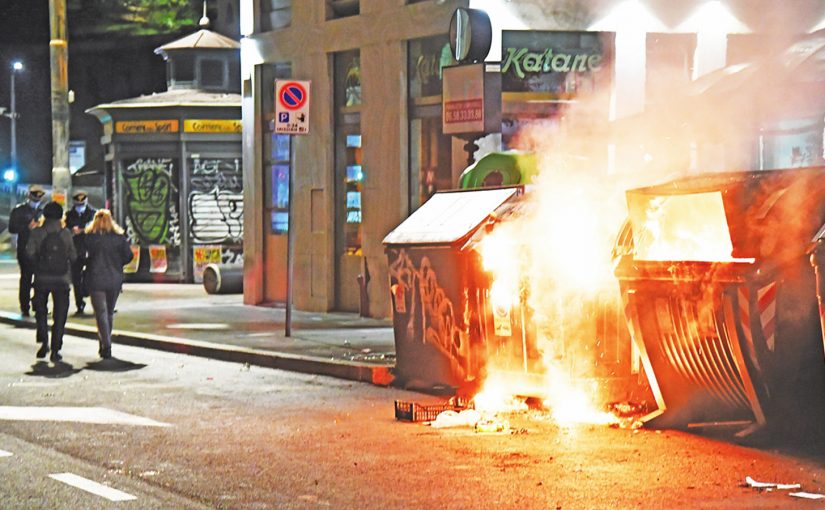Anger and exasperation over new coronavirus curbs grew Sunday as European nations wound back the clocks to the spring with fresh lockdowns and restrictions aimed at halting galloping infections and deaths
Protesters in several Spanish cities clashed with security forces for a second night running Saturday, police said, while England prepared for fresh stay-at-home orders, following in the steps of Austria, France and Ireland.
European governments are desperate to stem the worrying spike in infections on the continent which has registered more than 279,000 deaths since the virus first emerged in China at the end of 2019.
In England, many expressed anxiety about the economic cost of the four-week shutdown due to take effect from Thursday, even if it will not be as strict as before with schools and universities allowed to remain open — just like in France.
“This city will go bust, there will be nothing left of it,” said Roger Stenson, a 73-year-old pensioner in the city of Nottingham, echoing widespread concern over the long-lasting impact of another shutdown.
“I fear for the young, like my own grandchildren and great-grandchildren, they’re going to suffer.”
Michael Kill, CEO of the Night Time Industries Association, which lobbies for the entertainment and hospitality sector, said the new closures would leave businesses facing “financial Armageddon”.
‘Terrifying curve’
In Spain, the anger that spilled onto the streets overnight Saturday saw looting and vandalism breaking out in some cities.
The country has imposed a nationwide nighttime curfew and almost all of Spain’s regions have implemented regional border closures to prevent long-distance travel.
The biggest disturbances were in Madrid where scores of demonstrators chanting “freedom!” torched rubbish bins and set up makeshift barricades on the city’s main thoroughfare, the Gran Via, images on social media showed.
Italy was also the scene of protests last week.
But the government there is still expected to announce new restrictions on Monday, according to news reports.
These are expected to include banning travel between regions, closing shopping centres at the weekend, limiting commercial activity and imposing an earlier nighttime curfew.
“The epidemiological curve is still very high,” Health Minister Roberto Speranza, who has been pushing for a country-wide lockdown, told the Corriere della Sera daily.
“What worries me is the absolute figure, which shows a terrifying curve. Either we bend it, or we are in trouble,” he said.
Restrictions also led to unrest in Argentina, where riots took place in several jails in Buenos Aires province on Saturday, as prisoners demanded the resumption of visits in the pandemic.
‘A slap’
The health situation is also deteriorating in the United States, which is gearing up for a major election showdown between President Donald Trump and his Democratic contender Joe Biden on Tuesday.
Already the worst-affected country with 230,586 deaths, it also registered 776 new fatalities on Saturday, the largest number in the world, according to an AFP tally from official sources.
Top government scientist Anthony Fauci told the Washington Post in a interview published on Saturday that the US is “in for a whole lot of hurt.”
“All the stars are aligned in the wrong place,” he said.
The widely-popular Halloween celebration was a muted affair this year, particularly in Salem, Massachusetts.
The coastal city that infamously held witch trials in the 17th century is a draw for chill-seekers, and while grim reapers, mad scientists and tarot readers still paraded the streets on Saturday, authorities decided to shut down the city at 8 pm to avoid crowds.
In Germany, the sadness was palpable at the renown Bavarian State Opera House in Munich as it prepared to close due to shutdowns in the leisure, cultural and food and drink sectors.
It is “a slap”, said baritone Michael Nagy, unable to hide his tears.
There was speculation in France that the government may even stop supermarkets from selling some “non-essential” items to protect small shopkeepers who have been forced to close.
The virus has killed at least 1,196,109 people worldwide since the outbreak emerged last December, infecting more than 46 million.
Courtesy:
www.globaltimes.cn
